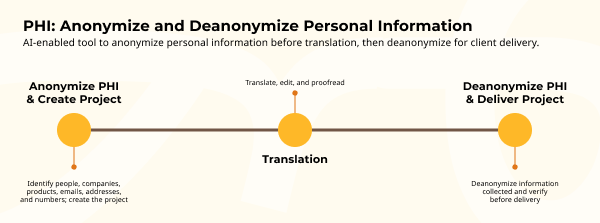PHI: Leveraging AI to Protect Personal Data
Improving Efficiency, Accuracy, and Patient Privacy in Multilingual Clinical Studies As clinical research and regulatory teams work to ensure patient privacy and monitor compliance and safety, they are increasingly turning to artificial intelligence (AI) to automate processes and provide valuable data insights. The use of AI in the clinical research industry is rapidly growing, with…

Improving Efficiency, Accuracy, and Patient Privacy in Multilingual Clinical Studies
As clinical research and regulatory teams work to ensure patient privacy and monitor compliance and safety, they are increasingly turning to artificial intelligence (AI) to automate processes and provide valuable data insights. The use of AI in the clinical research industry is rapidly growing, with companies looking to leverage the technology to streamline processes, reduce turnaround time, and improve accuracy.
However, clinical studies are often conducted in multiple languages, which complicates the compliance process. Ensuring accurate translations while protecting patient privacy is a challenging task that can require a significant amount of time and resources. This is where Welocalize’s AI-enabled language services can make a significant difference.
AI can reduce the turnaround time on translations while ensuring the protection of patients’ health information (PHI), scanning for adverse events, and screening for sensitive content prior to translation. Companies can use AI capabilities to anonymize and deanonymize highly confidential customer information, replacing patient health information (PHI) using named entity recognition (NER) with anonymized content before sending it across to linguists for contextual translation.

Compliance and Privacy
Anonymizing confidential patient information is particularly important in the clinical research industry, where the privacy of participants is paramount. By using NER to replace patient health information with anonymized content, companies can protect the privacy of participants while still ensuring accurate translations.
Multilingual and Sensitive Content
AI-enabled language services are beneficial for clinical research studies that involve multiple languages. These studies require accurate translations while protecting the privacy of participants, which can be a challenging task. AI can help to automate the translation process, ensuring that translations are consistent and accurate across multiple languages.
Furthermore, AI-enabled language services can also scan for adverse events and screen for sensitive content before the translation process. This helps to ensure that sensitive information is not accidentally disclosed during the translation process. By using AI to scan for adverse events, clinical research teams can identify potential safety concerns and respond quickly, reducing the risk of harm to patients.
Overall, the use of AI-enabled language services in clinical research is becoming increasingly popular due to its many benefits. By automating processes and providing data insights, AI can help to streamline processes, reduce turnaround time, and improve accuracy.
As clinical research and regulatory teams work to ensure patient privacy and monitor compliance and safety, AI-enabled language services can make a significant difference. By leveraging AI, companies can reduce the burden on clinical and regulatory teams while streamlining the translation process and improving accuracy.
AI-enabled language services will become an essential tool for companies looking to stay competitive and improve patient outcomes. By applying NLP and AI-enabled processes in advance of the translation process, companies can streamline translation processes for cost and time savings.
Want to learn more? Welocalize can help. Contact us for more.